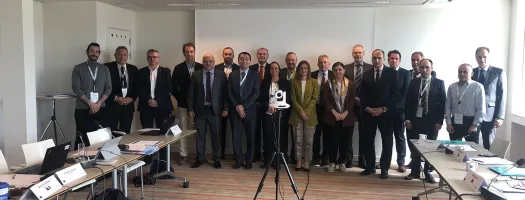The 18th National Focal Points (NFP) Round Table Meeting (RMT) for South East and Eastern Europe (SEEE), within the framework of the European Union (EU) Chemical, Biological, Radiological and Nuclear (CBRN) Risk Mitigation Centres of Excellence (CoE) Initiative, took place on 16 May 2022. It was held on the sidelines of the International NFP Days meeting, organized by the European Commission in Brussels, Belgium.
This was the first meeting in person, after the breakout of the COVID-19 global pandemic. NFPs and their delegated representatives from the following Partner Countries took part in the event: Albania, Armenia, Azerbaijan, Bosnia and Herzegovina, Georgia, Moldova, Montenegro, North Macedonia, and Serbia. The SEEE Regional Secretariat, UNICRI and different institutions of the European Commission such as the Migration and Home Affairs (DG HOME), the European Civil Protection and Humanitarian Aid Operations (DG ECHO), the Joint Research Centre (JRC) and the Service for Foreign Policy Instruments (FPI), took an active part in the 18th NFP RTM.
The purpose of the meeting was to discuss the final steps of the CBRN Regional Action Plan (RAP) preparation, receive updates from the European Commission about the CBRN policy, hear about ongoing and future projects and activities, confirm the timeline of two projects being developed in the region, and inform about the planning of the regional field exercise on biosafety and biosecurity.
Countries of the SEEE region provided their final feedback on the CBRN Regional Action Plan. As the living document to be updated frequently based on the identified needs and gaps, the CBRN Regional Action Plan will be adopted and validated by the NFPs. The purpose of the RAP is to provide the policy framework to guide the creation and maintenance of sustainable capabilities and common standards in chemical, biological, radiological and nuclear policies, programmes, equipment and training. The RAP, therefore, serves as a regional policy-guiding document for the diverse set of governmental bodies and other stakeholders tasked with responsibilities in chemical, biological, radiological and nuclear issues.
Eleven priority areas were identified by the subject matter experts of ten partner countries for the upcoming five-year time frame. Five out of eleven regional priorities in the field of CBRN safety and security will be addressed through the implementation of new projects in the SEEE region. This unique approach will bring additional value to the region by enhancing cooperation and efficacy, potentially lead to the attraction of additional funding, and showcase regional priorities in the context of the entire Initiative.
On behalf of the DG ECHO, Mr. Tristan Simonart presented an overview of the international civil cooperation framework in the European neighborhood from 2022 to 2026. He gave an update on the European Union Civil Protection Mechanism, Emergency Response Coordination Centre, and External regional programmes and grants provided to some of the selected partner countries of the SEEE region. Synergies with the EU CBRN CoE activities and complementarity of joint efforts will be the cornerstone of the cooperation in place during the implementation of parallel initiatives.
The NFP Round Table meeting also represented an excellent opportunity to attend the detailed presentation about the EU CBRN security policy which was delivered by Mr. Wiktor Wojtas from the DG HOME. He spoke about the 2017 Action Plan to enhance preparedness against chemical, biological, radiological and nuclear security risks. He gave an update on the establishment of the ad-hoc expert group on CBRN threat detection; the development of the EU list of dangerous chemicals, and of the EU list of dangerous chemical precursors; and the study on the feasibility of restricting access to dangerous chemicals which can be used for terrorist attacks. Participants were also updated on the ongoing and planned activities related to the SEEE region.



